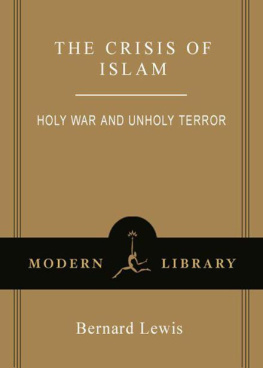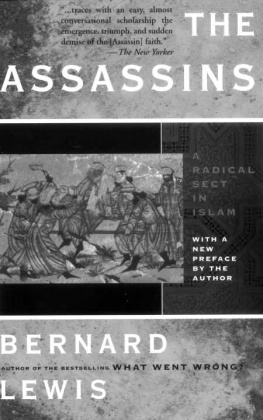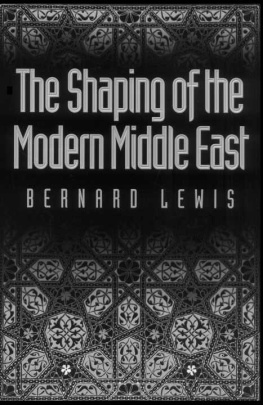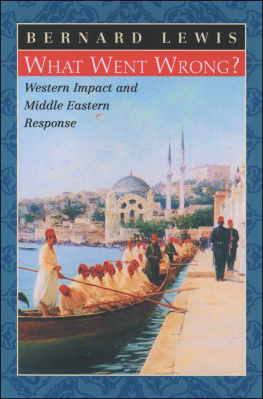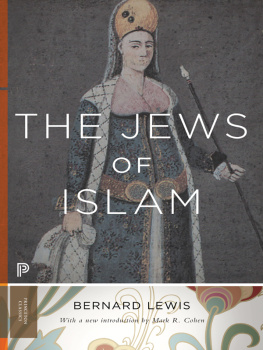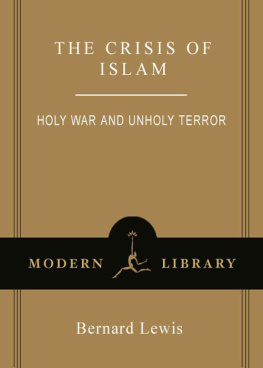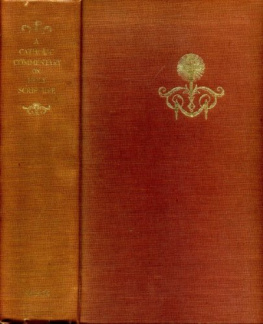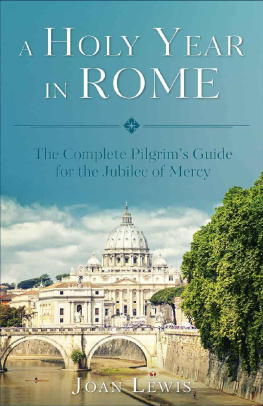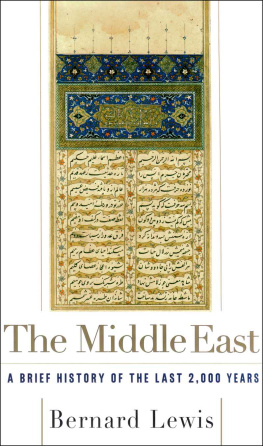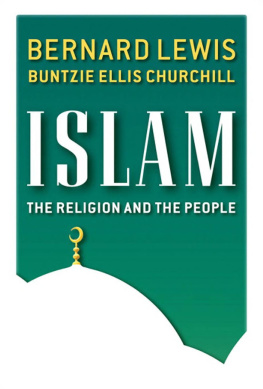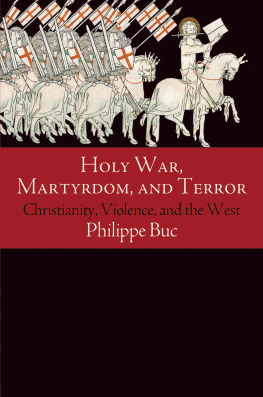Bernard Lewis - The Crisis of Islam: Holy War and Unholy Terror
Here you can read online Bernard Lewis - The Crisis of Islam: Holy War and Unholy Terror full text of the book (entire story) in english for free. Download pdf and epub, get meaning, cover and reviews about this ebook. year: 2003, publisher: Modern Library, genre: Religion. Description of the work, (preface) as well as reviews are available. Best literature library LitArk.com created for fans of good reading and offers a wide selection of genres:
Romance novel
Science fiction
Adventure
Detective
Science
History
Home and family
Prose
Art
Politics
Computer
Non-fiction
Religion
Business
Children
Humor
Choose a favorite category and find really read worthwhile books. Enjoy immersion in the world of imagination, feel the emotions of the characters or learn something new for yourself, make an fascinating discovery.
- Book:The Crisis of Islam: Holy War and Unholy Terror
- Author:
- Publisher:Modern Library
- Genre:
- Year:2003
- Rating:4 / 5
- Favourites:Add to favourites
- Your mark:
- 80
- 1
- 2
- 3
- 4
- 5
The Crisis of Islam: Holy War and Unholy Terror: summary, description and annotation
We offer to read an annotation, description, summary or preface (depends on what the author of the book "The Crisis of Islam: Holy War and Unholy Terror" wrote himself). If you haven't found the necessary information about the book — write in the comments, we will try to find it.
The Crisis of Islam: Holy War and Unholy Terror — read online for free the complete book (whole text) full work
Below is the text of the book, divided by pages. System saving the place of the last page read, allows you to conveniently read the book "The Crisis of Islam: Holy War and Unholy Terror" online for free, without having to search again every time where you left off. Put a bookmark, and you can go to the page where you finished reading at any time.
Font size:
Interval:
Bookmark:


Contents
TO HAROLD RHODE
IN FRIENDSHIP
T HE C RISIS OF I SLAM




Introduction
President Bush and other Western politicians have taken great pains to make it clear that the war in which we are engaged is a war against terrorismnot a war against Arabs, nor, more generally, against Muslims, who are urged to join us in this struggle against our common enemy. Usama bin Ladins message is the opposite. For bin Ladin and those who follow him, this is a religious war, a war for Islam against infidels, and therefore, inevitably, against the United States, the greatest power in the world of the infidels.
In his pronouncements, bin Ladin makes frequent references to history. One of the most dramatic was his mention, in his videotape of October 7, 2001, of the humiliation and disgrace that Islam has suffered for more than eighty years. Most Americanand, no doubt, Europeanobservers of the Middle Eastern scene began an anxious search for something that had happened more than eighty years ago, and came up with various answers. We can be fairly sure that bin Ladins Muslim listenersthe people he was addressingpicked up the allusion immediately and appreciated its significance.
In 1918 the Ottoman sultanate, the last of the great Muslim empires, was finally defeatedits capital, Constantinople, occupied, its sovereign held captive, and much of its territory partitioned between the victorious British and French Empires. The Arabic-speaking former Ottoman provinces of the Fertile Crescent were divided into three new entities, with new names and frontiers. Two of them, Iraq and Palestine, were under British Mandate; the third, under the name Syria, was given to the French. Later, the French subdivided their mandate into two, calling one part Lebanon and retaining the name Syria for the rest. The British did much the same in Palestine, creating a division between the two banks of the Jordan. The eastern segment was called Transjordan, later simply Jordan; the name Palestine was retained and reserved for the Western segment, in other words, the Cisjordanian part of the country.
The Arabian peninsula, consisting largely of barren and inaccessible deserts and mountains, was at that time thought not worth the trouble of taking over, and its rulers were allowed to retain a precarious and limited independence. The Turks eventually succeeded in liberating their Anatolian homeland, not in the name of Islam but through a secular nationalist movement led by an Ottoman general called Mustafa Kemal, better known as Kemal Atatrk. Even as he foughtsuccessfullyto liberate Turkey from Western domination, he took the first steps toward the adoption of Western or, as he preferred to put it, modern ways. One of his first acts, in November 1922, was to abolish the sultanate.
The Ottoman sovereign was not only a sultan, the ruler of a specific state; he was also widely recognized as the caliph, the head of all Sunni Islam, and the last in a line of rulers that dated back to the death of the Prophet Muhammad in 632 C.E. and the appointment of a successor to take his place, not as spiritual but as religious and political head of the Muslim state and community. After a brief experiment with a separate caliph, the Turks, in March 1924, abolished the caliphate, too.
During its nearly thirteen centuries, the caliphate had gone through many vicissitudes, but it remained a potent symbol of Muslim unity, even identity; its disappearance, under the double assault of foreign imperialists and domestic modernists, was felt throughout the Muslim world. Some rather halfhearted attempts were made by various Muslim monarchs and leaders to claim the vacant title, but none of them gained much support. Many Muslims are still painfully conscious of this void, and it is said that Usama bin Ladin himself hador hasaspirations to the caliphate.
The word caliph comes from the Arabic khal fa, which by a useful ambiguity combines the meanings of successor and deputy. Originally, the head of the Islamic community was the Khal
fa, which by a useful ambiguity combines the meanings of successor and deputy. Originally, the head of the Islamic community was the Khal fa of the Prophet of God. Some, more ambitious, shortened the title to the Khal
fa of the Prophet of God. Some, more ambitious, shortened the title to the Khal fa of God. This claim to spiritual authority was hotly contested and eventually abandoned, though a title expressing a similar but somewhat lesser claim, the Shadow of God on earth, was widely used by Muslim rulers. For most of the history of the institution, the holders of the caliphate contented themselves with the more modest title Am
fa of God. This claim to spiritual authority was hotly contested and eventually abandoned, though a title expressing a similar but somewhat lesser claim, the Shadow of God on earth, was widely used by Muslim rulers. For most of the history of the institution, the holders of the caliphate contented themselves with the more modest title Am r al-Mumin
r al-Mumin n, usually translated as Commander of the Faithful.
n, usually translated as Commander of the Faithful.
Historical allusions such as bin Ladins, which may seem abstruse to many Americans, are common among Muslims, and can be properly understood only within the context of Middle Eastern perceptions of identity and against the background of Middle Eastern history. Even the concepts of history and identity require redefinition for the Westerner trying to understand the contemporary Middle East. In current American usage, the phrase thats history is commonly used to dismiss something as unimportant, of no relevance to current concerns, and despite an immense investment in the teaching and writing of history, the general level of historical knowledge in American society is abysmally low. The Muslim peoples, like everyone else in the world, are shaped by their history, but unlike some others, they are keenly aware of it. Their awareness dates however from the advent of Islam, with perhaps some minimal references to pre-Islamic times, necessary to explain historical allusions in the Quran and in the early Islamic traditions and chronicles. Islamic history, for Muslims, has an important religious and also legal significance, since it reflects the working out of Gods purpose for His communitythose that accept the teachings of Islam and obey its law. The history of non-Muslim states and peoples conveys no such message and is therefore without value or interest. Even in countries of ancient civilization like those of the Middle East, the knowledge of pagan historyof their own ancestors, whose monuments and inscriptions lay around themwas minimal. The ancient languages and scripts were forgotten, the ancient records buried, until they were recovered and deciphered in modern times by inquisitive Western archaeologists and philologists. But for the period beginning with the advent of Islam, the Muslim peoples produced a rich and varied historical literatureindeed, in many regions, even in countries of ancient civilization like India, serious historical writing begins with the arrival of Islam.
Next pageFont size:
Interval:
Bookmark:
Similar books «The Crisis of Islam: Holy War and Unholy Terror»
Look at similar books to The Crisis of Islam: Holy War and Unholy Terror. We have selected literature similar in name and meaning in the hope of providing readers with more options to find new, interesting, not yet read works.
Discussion, reviews of the book The Crisis of Islam: Holy War and Unholy Terror and just readers' own opinions. Leave your comments, write what you think about the work, its meaning or the main characters. Specify what exactly you liked and what you didn't like, and why you think so.

